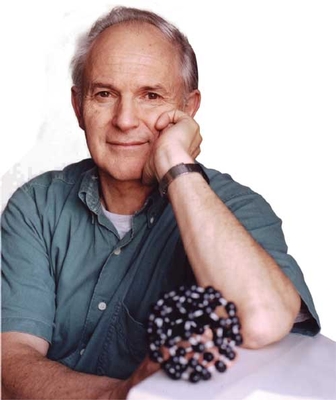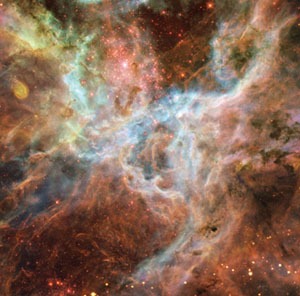 You are a chemist but your first love is graphic design. Is there common ground?
You are a chemist but your first love is graphic design. Is there common ground?
There are very similar processes involved. In science we seek to discover the patterns that underpin the way the universe works and take great delight when we uncover them. For me one of the most satisfying revelations is the fact that the simple number sequence 1, 3, 5... which maps on to (1x2), (1x2 + 3x2), (1x2 + 3x2 + 5x2)... leads us to the periodic table whose rows consist of 2, 8, 18... elements. Thus the numeric sequence 1, 3, 5... underpins the whole of chemistry and biology, and thus all of life. I get a similar sort of cathartic satisfaction when I create an effective drawing or a clever logo.
You won a Nobel for the discovery of Buckminsterfullerenes. What are they?
C60 Buckminsterfullerene (aka “Buckyball”) is a closed cage pure carbon molecule in which the atoms are arranged in the 12 pentagon/20 hexagon soccerball pattern. It is the first member of a vast family of such stable cages. Its importance lies in its spontaneous self-assembly from a chaotic carbon atom plasma, which opened our eyes to the fundamental forces controlling self-assembly on a nanoscale. The fact that they were discovered in an experiment to simulate the conditions in red giant stars suggested to me that this molecule must exist in space. This was confirmed in July this year and it seems – amazingly – that there may be as much as one per cent of the interstellar carbon budget locked up in the form of C60. I named it after Buckminster Fuller because his geodesic domes were a crucial clue in conjecturing what the structure might be.
Why does science matter?
For me science is first and foremost the philosophical construct that the human race has developed to determine, as reliably as possible, what might be true, can be true and more importantly cannot be true. It requires of course infinite doubt and evidence to have any reasonable degree of certainty. Science is about Truth with a capital T, but whether or not it is involved in how we should behave is not obvious. I believe that humanity is our (the human race’s) greatest single achievement and I do not give the credit for the development of this wonderful attribute to any outside (mystical) entity. Indeed anyone who looks at nature with a discerning eye sees that there is precious little humanity to be seen in the way that the world works. How anyone can believe that an all-powerful entity, with even an iota of humanitarian sensitivity, could have created a living system that is so blatantly, intrinsically cannibalistic is beyond my belief.
What do you believe?
I am well aware that for many people belief in a mystical entity which cares about them is a crucial factor in their lives – perhaps even a life-saving one. There is an amazing gentleman, in Tallahassee where I live, who on his release after wrongful imprisonment for 25 years in a Florida jail said, “I thank God for this day.” Belief in a God enabled him to remain a remarkably decent human being in terrible circumstances. But it was science, i.e. DNA fingerprinting developed by Alec Jeffries at Leicester University, that got him out! I see religion as the Achilles heel of the human race and the major impediment to rational thinking. A moment’s clear thinking indicates that essentially no religion can be true. I am pretty hardline when it comes to criticising the ludicrous socio-political influence wielded by the vast global Church/Mosque/Synagogue/Temple conglomerate. It is the biggest business on the planet, bringing in untold funding from hordes of gullible people, many of them extremely poor. It is by far the biggest confidence trick of all time.
Your lecture is about the threats to science education. What threats? [Kroto gave the 2010 Bernal Lecture on Science and Society at Birkbeck College, London on 28 October]
The teaching of “How what is True can be recognised” should surely be the first and foremost aim of education and thus the dual doubt-based evidence-required assessment approach of science is the primary thing that should be taught. Faith-based schooling is obviously antagonistic to this and it is intellectually irresponsible and ethically invidious that the Government is using taxpayers’ money to create more faith schools. Those that claim that there is no conflict between science and religion are intellectually blind to the intrinsic orthogonality of these mutually opposed human constructs. There are a few scientists (not many good ones) who do not see a problem and it seems to me they suffer from some form of intellectual schizophrenia.
Harry Kroto is Francis Eppes Professor of Chemistry at Florida State University, and was awarded the Nobel Prize for Chemistry in 1996. He has set up two influential science education organisations: Vega and Geoset

